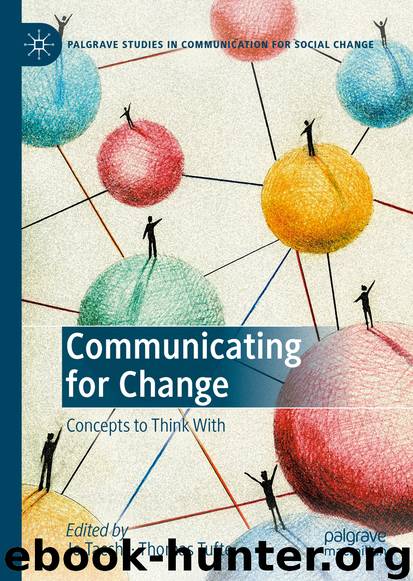Communicating for Change by Jo Tacchi & Thomas Tufte

Author:Jo Tacchi & Thomas Tufte
Language: eng
Format: epub
ISBN: 9783030425135
Publisher: Springer International Publishing
The notion of context-responsiveness has implications with respect to the discourse that frames development practice and research, and by analogy the interdisciplinary field of research and practice of communication for development and social change. The preoccupation with context in international development is closely related to ways of interpreting and theorising culture. In the Post-War Modernisation paradigm and the reaction to it which found expression in the Dependency paradigm, culture was taken to be an obstacle to development, something to be overcome for embracing the promises of technological innovation and development (Hemer and Tufte 2016). The cultural turn in development practice and research recognised, on the contrary, the essential role of culture for sustainable development, which builds upon local resources and engages local communities (Avgerou 2008; Hemer and Tufte 2016).
Context came to embody the wholeness of local conditions—including social, cultural, economic—which could no longer be ignored or dismissed for promised innovation breakthroughs to occur. However, context can be used as more than a container, umbrella concept for encompassing conditions in a locality. Coupled with the processual dimension provided by the notion of responsiveness, it can be used as a conceptual lens, a tool for informing research and intervention design methodology, and a device for researchers and practitioners to stay aware and reflexive while engaging in communication for social change research and initiatives. I will expound these ideas below, while engaging with a series of topics that I deem vital for the field of communication for social change, such as agency, responsibility, and cultural framing. I use vignettes that draw on present-day and historical realities and my own research, but are generalised in order to offer broader interpretation. While I would like to leave the framing of the context construct open, I use the examples below to show how some interpretations of context —particularly those that emphasise interactional and relational qualities—are more generative and can inform and sustain richer conceptual and methodological advances.
Download
This site does not store any files on its server. We only index and link to content provided by other sites. Please contact the content providers to delete copyright contents if any and email us, we'll remove relevant links or contents immediately.
Cecilia; Or, Memoirs of an Heiress — Volume 1 by Fanny Burney(32558)
The Great Music City by Andrea Baker(32020)
Cecilia; Or, Memoirs of an Heiress — Volume 2 by Fanny Burney(31956)
Cecilia; Or, Memoirs of an Heiress — Volume 3 by Fanny Burney(31942)
We're Going to Need More Wine by Gabrielle Union(19049)
All the Missing Girls by Megan Miranda(16031)
Pimp by Iceberg Slim(14509)
For the Love of Europe by Rick Steves(14124)
Bombshells: Glamour Girls of a Lifetime by Sullivan Steve(14077)
Talking to Strangers by Malcolm Gladwell(13371)
Norse Mythology by Gaiman Neil(13370)
Fifty Shades Freed by E L James(13243)
Mindhunter: Inside the FBI's Elite Serial Crime Unit by John E. Douglas & Mark Olshaker(9344)
Crazy Rich Asians by Kevin Kwan(9293)
The Lost Art of Listening by Michael P. Nichols(7506)
Enlightenment Now: The Case for Reason, Science, Humanism, and Progress by Steven Pinker(7314)
The Four Agreements by Don Miguel Ruiz(6765)
Bad Blood by John Carreyrou(6623)
Weapons of Math Destruction by Cathy O'Neil(6281)
